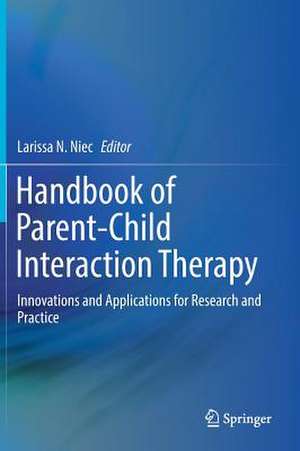Handbook of Parent-Child Interaction Therapy: Innovations and Applications for Research and Practice
Editat de Larissa N. Niecen Limba Engleză Hardback – 23 noi 2018
- PCIT for children with callous-unemotional traits.
- PCIT for families with a history of child maltreatment.
- Group PCIT.
- PCIT for military families.
- The PCIT CALM program for treating anxiety in young children.
- PCIT for American Indian families.
- Transporting and disseminating PCIT internationally.
- Using technology to expand the reach of PCIT.
Preț: 2110.31 lei
Preț vechi: 2573.55 lei
-18% Nou
Puncte Express: 3165
Preț estimativ în valută:
403.81€ • 422.67$ • 336.10£
403.81€ • 422.67$ • 336.10£
Carte tipărită la comandă
Livrare economică 31 martie-14 aprilie
Preluare comenzi: 021 569.72.76
Specificații
ISBN-13: 9783319976976
ISBN-10: 3319976974
Pagini: 822
Ilustrații: XXI, 423 p. 25 illus., 13 illus. in color.
Dimensiuni: 178 x 254 x 36 mm
Greutate: 1.06 kg
Ediția:1st ed. 2018
Editura: Springer International Publishing
Colecția Springer
Locul publicării:Cham, Switzerland
ISBN-10: 3319976974
Pagini: 822
Ilustrații: XXI, 423 p. 25 illus., 13 illus. in color.
Dimensiuni: 178 x 254 x 36 mm
Greutate: 1.06 kg
Ediția:1st ed. 2018
Editura: Springer International Publishing
Colecția Springer
Locul publicării:Cham, Switzerland
Cuprins
Part I: Introduction.- Chapter 1. Parent-Child Interaction Therapy: A Transdiagnostic Intervention to Enhance Family Functioning .- Part II: Adaptations for New Target Problems.- Chapter 2. PCIT for Children with Callous-Unemotional Traits.- Chapter 3. PCIT-Health: An Innovative Intervention for Childhood Obesity Prevention.- Chapter 4. Parent-Child Interaction Therapy for Families with a History of Child Maltreatment.- Chapter 5. Parent-Child Interaction Therapy for Military Families: Improving Relationships.- Chapter 6. The Turtle Program: PCIT for Young Children Displaying Behavioral Inhibition.- Chapter 7. Parent-Child Interaction Therapy for Children with Developmental Delay and Related Problems.- Chapter 8. Parent-Child Interaction Therapy for Children with Selective Mutism.- Chapter 9. Adapting PCIT to Treat Anxiety in Young Children: The PCIT CALM Program.- Part III: Innovations in Format and Setting.- Chapter 10. Group PCIT: Increasing Access and Leveraging Positive Parent Pressure.- Chapter 11. Taking PRIDE in Your Home: Implementing Home-Based PCIT with Fidelity.- Chapter 12. Parent-Child Interaction Therapy for Toddlers.- Chapter 13. Parent-Child Interaction Therapy: Conceptualizing a Continuum of Prevention.- Chapter 14. Teacher-Child Interaction Training.- Part IV: Adaptations for Diverse Populations.- Chapter 15. Cultural Enhancement of PCIT for American Indian Families: Honoring Children, Making Relatives.- Chapter 16. Tailoring PCIT for Latino/a Families.- Chapter 17. Transporting PCIT Around the World.- Part V: Innovations in Assessment.- Chapter 18. Dyadic Parent-Child Interaction Coding System: An Adaptable Measure of Parent and Child Behavior During Dyadic Interactions.- Chapter 19. Therapist-Parent Interactions in PCIT: The Importance of Coach Coding.- Chapter 20. Assessing Therapist Competence within the Context of PCIT Training.- Chapter 21. Building Resilience through PCIT: Assessing Child Adaptive Functioning and Parent-Child Relationship Quality.- Part VI: Innovations in Implementation and Dissemination.- Chapter 22. Training & Supervision Around the World.- Chapter 23. Using Technology to Expand the Reach of PCIT.- Chapter 24. Getting Parent-Child Interaction Therapy to Scale.- Part VII: Next Steps.- Chapter 25. Parent-Child Interaction Therapy: Taking the Next Steps.
Notă biografică
Larissa N. Niec, Ph.D. is the Director of the Center for Children, Families, and Communities and Professor of Psychology at Central Michigan University. Dr. Niec publishes extensively on PCIT, with a focus on developing and evaluating adaptations to PCIT that have the potential to reduce mental health disparities among underserved populations. She has trained doctoral students and community clinicians in PCIT for more than 20 years and is one of 20 Master Trainers in the world who have been certified by PCIT International to disseminate PCIT nationally and internationally. Dr. Niec has trained PCIT therapists throughout the Midwestern United States, Canada, Australia, and Europe.
Textul de pe ultima copertă
This handbook examines advances in the evidence-based behavioral family intervention, parent-child interaction therapy (PCIT). It surveys innovative adaptations tailored to specific diagnostic concerns, client populations, treatment settings, and delivery formats. Chapters provide rationales for adaptation, reviews of relevant research, and discussions of advantages and challenges. Case studies illustrate the implementation of the adaptations and help to make new techniques concrete. The handbook offers practical descriptions of the adaptations to PCIT, comprehensively reviews treatment outcome literature, and integrates cutting-edge implementation science into an exploration of the current dissemination strategies in PCIT. The handbook concludes with a consideration of the questions that remain to be addressed to extend the reach of PCIT among traditionally underserved families and to continue to advance the science and practice of children’s mental health interventions.
Featured topics include:
- PCIT for children with callous-unemotional traits.
- PCIT for families with a history of child maltreatment.
- Group PCIT.
- PCIT for military families.
- The PCIT CALM program for treating anxiety in young children.
- PCIT for American Indian families.
- Transporting and disseminating PCIT internationally.
- Using technology to expand the reach of PCIT.
Caracteristici
Examines state-of-the-science adaptations to parent-child interaction therapy (PCIT) for problems, such as selective mutism and depression
Reviews various delivery formats (e.g., prevention models, group treatment)
Addresses PCIT for diverse cultural groups (e.g., Native Americans)
Details advantages and challenges of implementing PCIT modifications
Explores potential use of PCIT among traditionally underserved families
Reviews various delivery formats (e.g., prevention models, group treatment)
Addresses PCIT for diverse cultural groups (e.g., Native Americans)
Details advantages and challenges of implementing PCIT modifications
Explores potential use of PCIT among traditionally underserved families
